
The Bahujan Samaj Party (BSP) is a national level political party in India that was formed to represent Bahujans, referring to Scheduled Castes, Scheduled Tribes, and Other Backward Classes (OBC), along with religious minorities. According to Kanshi Ram, when he founded the party in 1984, the Bahujans comprised 85 percent of India's population, but were divided into 6,000 different castes. The party claims to be inspired by the philosophy of Gautama Buddha, B. R. Ambedkar, Mahatma Jyotiba Phule, Narayana Guru, Periyar E. V. Ramasamy and Chhatrapati Shahuji Maharaj. Kanshi Ram named his protégée, Mayawati, as his successor in 2001. The BSP has its main base in the Indian state of Uttar Pradesh where it was the second-largest party in the 2019 Indian general election with 19.3% of votes and third-largest in the 2022 Uttar Pradesh Legislative Assembly election with 12.88% of votes. Its election symbol is an elephant which is the same symbol historically used by Dr. Ambedkar's Scheduled Castes Federation.
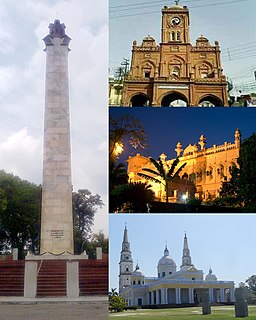
Meerut is a city in Meerut district of the western part of the Indian state of Uttar Pradesh. It is an ancient city, with settlements dating back to the Indus Valley civilisation having been found in and around the area. The city lies 70 km (43 mi) northeast of the national capital New Delhi, within the National Capital Region and 430 km (270 mi) west of the state capital Lucknow.
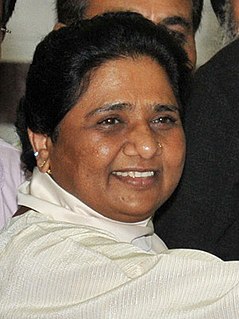
Mayawati is an Indian politician. She has served four separate terms as Chief Minister of Uttar Pradesh. She is the national president of the Bahujan Samaj Party (BSP), which focuses on a platform of social change for Bahujans, more commonly known as Other Backward Castes, Scheduled Castes and Scheduled Tribes as well as converted minorities from these castes. She was chief minister briefly in 1995 and again in 1997, then from 2002 to 2003 and from 2007 to 2012.

Santacruz or Santa Cruz is a neighbourhood of Mumbai. The Santacruz railway station on the Mumbai Suburban Railway, the domestic terminal (T1) of the Chhatrapati Shivaji Maharaj International Airport, and one campus of the University of Mumbai, are all located in Santacruz (East).

Kanshi Ram, also known as Bahujan Nayak or Manyavar or Saheb, was an Indian politician and social reformer who worked for the upliftment and political mobilisation of the Bahujans, the backward or lower caste people including untouchable groups at the bottom of the caste system in India. Towards this end, Kanshi Ram founded Dalit Shoshit Samaj Sangharsh Samiti (DS-4), the All India Backward (SC,ST,OBC..) and Minorities Communities Employees' Federation (BAMCEF) in 1971 and the Bahujan Samaj Party (BSP) in 1984. He ceded leadership of the BSP to his protégé Mayawati who has served four terms as Chief Minister of Uttar Pradesh.
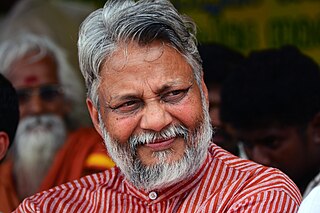
Rajendra Singh is an Indian water conservationist and environmentalist from Alwar district, Rajasthan in India. Also known as "waterman of India", he won the Magsaysay Award in 2001 and Stockholm Water Prize in 2015. He runs an NGO called 'Tarun Bharat Sangh' (TBS), which was founded in 1975. The NGO based in village hori-Bhikampura in Thanagazi tehsil, near Sariska Tiger Reserve, has been instrumental in fighting the slow bureaucracy, mining lobby and has helped villagers take charge of water management in their semi-arid area as it lies close to Thar Desert, through the use of johad, rainwater storage tanks, check dams and other time-tested as well as path-breaking techniques. Starting from a single village in 1985, over the years TBS helped build over 8,600 johads and other water conservation structures to collect rainwater for the dry seasons, has brought water back to over 1,000 villages and revived five rivers in Rajasthan, Arvari, Ruparel, Sarsa, Bhagani and Jahajwali. He is one of the members of the National Ganga River Basin Authority (NGRBA) which was set up in 2009, by the Government of India as an empowered planning, financing, monitoring and coordinating authority for the Ganges (Ganga), in exercise of the powers conferred under the Environment (Protection) Act, 1986. In the UK he is a founder member of an NGO called the Flow Partnership. which aims to counter the negative effects of soil erosion and flooding.
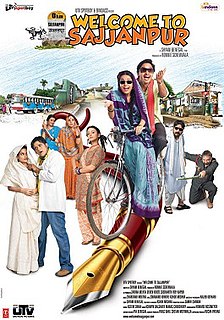
Welcome to Sajjanpur is a 2008 Indian Hindi comedy film directed by Shyam Benegal and starring Shreyas Talpade and Amrita Rao in the lead roles. The film is by noted Parallel cinema director, Shyam Benegal, marking his return to comedy after filming Charandas Chor (1975). Even though Benegal is responsible for other films in the parallel cinema genre, this film was one of his mainstream Bollywood films. It was a remake of the 1977 film Palkon Ki Chhaon Mein. The film was both critically and commercially successful.
Harduaganj Thermal Power Station is located at Qasimpur Power House Colony which is 1 km distance from Harduaganj railway station at Harduaganj in Aligarh district in the Indian state of Uttar Pradesh, about 18 km from Aligarh and 105 km from Agra. It is the new electric power station established in Aligarh district; the old one is Sumera Hydroelectric Power Plant located in Jawan Sikandarpur of Aligarh district.
Bangaon is an ancient northern Indian village situated in the Saharsa district of Bihar. Some historians believe that 'Apannigam' referred in Buddhistic literature is Bangaon. Bangaon is part of Kahra Block of the district. Some of the neighbouring places include Bariahi, Bangaon, Chainpur, Mahishi and Bihar (north). Bangaon is divided into three panchayats namely Bangaon North, Bangaon South and Bangaon East.
Kalri Jagir is a village in the district Karnal, Haryana, (India). It is on the bank of Amalgamation canal and is not very far from the River Yamuna. Yamuna flows about 4 km from here.
Veerahanumakkanapalya is a village in Pavagada taluk of Tumkur district in Indian state of Karnataka. Located on the Pavagada-Sira road at 24 kilometers from Pavagada, it is only 1 kilometer away from Mangalavada. Veerahanumakkanapalya and Mangalavada are twin villages.
Argaon, or Argaum is a village in the Ratnagiri district of Maharashtra state in (India). Ratnagiri is a coastal district on the Arabian Seafront. The landmass on the western part of Maharashtra along the Arabian Sea, sandwiched between the sea and a mountain range named Sahyadri, is known as Konkan. Argaon is situated in the foothills of the Sahyadri mountains.

Babu Singh Kushwaha is an Indian politician in Uttar Pradesh. He was one of Mayawati's most trusted and a senior member of the UP cabinet. He is the chairman of the Jan Adhikar Party.
Jubbet ad-Dib is a small Palestinian village in the central West Bank, part of the Bethlehem Governorate. It is located about 6.5 kilometers southeast of Bethlehem and is just east of the Palestinian town of Jannatah and north of the Israeli settlement Kfar Eldad. Its lands border on the settlement of Havat Sdeh Bar. It had a population of 162 according to the 2007 census by the Palestinian Central Bureau of Statistics (PCBS). Jubbet ad-Dib has a total land area of 402 dunams, of which 8 constitute as built-up area, and is situated at an altitude of 628 meters above sea level.
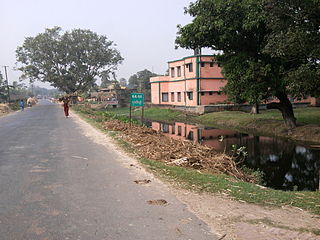
Dullipatti is a village, situated in Madhubani district of Bihar, near the Nepal international border. National Highway 105 passes through this village and is 6 kilometers away from Jainagar, sub-division.
Uttar Pradesh Power Corporation Limited (UPPCL) is the company responsible for electricity transmission and distribution within the Indian state of Uttar Pradesh. The incumbent chairman is Shri M. Devraj.

Siddharth Nigam is an Indian actor who works in Indian television and films. He is known for his role as young Sahir and Samar in Dhoom 3, young Mauryan prince Ashoka in Colors TV's Chakravartin Ashoka Samrat, Prince Bindusara in StarPlus's Chandra Nandini and Aladdin in Sony SAB's Aladdin – Naam Toh Suna Hoga.

The 2017 Patan riots refers to the riots between Muslims and Hindus in the Vadavali village in Gujarat’s Patan district.

Newton is a 2017 Indian Hindi-language black comedy drama film co-written and directed by Amit V. Masurkar. The film stars Rajkummar Rao in the titular role of a government servant who is sent to a politically sensitive area of the central India on election duty. Pankaj Tripathi, Anjali Patil and Raghubir Yadav appeared in prominent roles. The film was produced by Manish Mundra under Drishyam Films, known for the 2015 film Masaan, and the film is Amit Masurkar’s second feature after his debut film, Sulemani Keeda in 2013.
JJ Colony is a resettlement colony on the Gram Sabha Land of Madanpur Khadar Village in the south-eastern region of Delhi. It is located in close proximity to Sarita Vihar and Kalindi Kunj, about 1 kilometers from the Uttar Pradesh border. It was created in 2004 when the slum dwellers from across Delhi were forcefully evicted and relocated to the urban peripheries. Since its formation, the community has undergone massive structural, political, economic, and social changes affecting the lives of the community. The transformation of JJ Colony in Khadar is underscored by several challenges ranging from the provision of basic amenities, mobility, and the condition of women's safety. From then to now JJ colony in khadar has changed much from the lanes of agriculture canal to road channels has come far bit.













